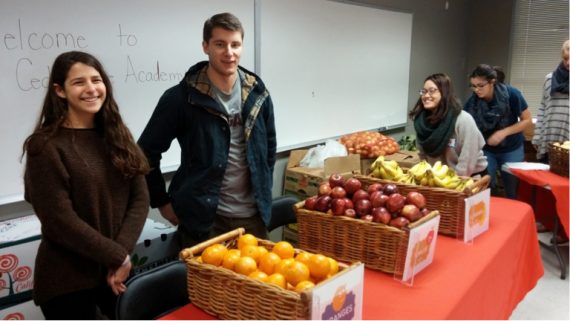
Students volunteering at pop-up food cupboard in Washington DC.
The Max A. Shacknai COVE continues to offer opportunities to deepen student understanding of complex social issues by providing for immersive experiences in environments very different from those available in the local community. Students participate in a series of preparation and reflective activities to create a rich learning opportunity. Alternative break trips are not discrete, one-week experiences. In addition to committing to a work-intensive week, students are responsible for attending pre-departure meetings that introduce the participants to the community and organization with which they will be working and the critical issues with which they will be dealing.
Participants are civically engaged students interested in affecting sustainable local and global change through a continued commitment. In total, 71 participants in these programs contributed more than 3,000 hours of direct service to these communities this year:
- Habitat for Humanity Spring Break Trip, Wilmington, DE
Volunteers worked on new construction of 9 townhouses in Wilmington, Del. Habitat for Humanity houses are simple, and affordable to low income families. Whenever possible, Habitat energy-efficient, sustainable housing. The goal of Habitat for Humanity is to help solve the global housing crisis and help the 48.5 million people who are living in poverty. - Hunger and Homelessness Outreach Winter Break Trip, Washington, DC
America is one of the world’s wealthiest nations, especially when it comes to our agricultural production, yet enough food goes to waste each day to feed every hungry adult and child living in the nation. Each night, some five million children go to bed hungry. As many as 3.5 million people each year have no bed to call their own due to homelessness. Participants had the opportunity to explore the root causes and efforts to improve the hunger and homelessness situation in America through a series of site visits, guest speakers, and discussions. Participants volunteered at soup kitchens and with various organizations that specialize in assisting and empowering the homeless population. One participant shared, “Going into the program, I knew that I had certain stereotypes of people suffering from homelessness and hunger and these speakers helped eradicate those stereotypes and left me with a very powerful message about ending homelessness…It was great to have such meaningful conversations with a diverse group of people that were previously strangers.” - Disaster Response Winter Break Trip, New Orleans, LA
The Lower Nine is a nonprofit organization that helps rebuild homes, facilitates access to social services, works with the youth, and experiments with models of sustainable economic development in the Lower Ninth Ward of New Orleans. The Lower Ninth Ward was one of the hardest-hit neighborhoods in the New Orleans area and rebuilding the ward has been delayed due to poverty, the scale of devastation and local, state, and federal inaction. Participants assisted with rebuilding houses that are still feeling the effects of Katrina more than 10 years later. - Civil Rights and Social Justice Advocacy Spring Break Trip, Selma, Ala.
The Freedom Foundation has hosted college students as part of a unique Alternative Break program, focusing on service and education related to the civil rights movement. As a place of significance during the Civil War and the civil rights movement, Selma is very much in touch with its past. Participants were involved in a variety of activities including working with Selma students in grades K-12 and Leadership/Non-Violence Training. One participant shared, “Selma, AL: a town of disparity, history, and hope. Through this trip, I was able to see these traits not only in the town, but also in myself. It was easy to believe that there is not much hope for places like Selma since there are still several fundamental issues that have not been resolved. However, the trip reminded me that there is hope and there are many ways to bring about change. One particular part of the program that helped me realize this was the Non-Violence Conflict Training. By talking about these issues found both in Selma and on college campuses, I was able to look introspectively and outward at my surroundings. I realized that change comes from within and one has to hold onto hope. While some may think that his or her actions are futile, this trip taught me that there are several ways to help and bring about change. As President Obama said, ’We are the change that we seek.’” - Medical Spring Break Trip, Panama
This one-week Medical Brigade to Panama, through Global Brigades, provided volunteers with the opportunity to make a tangible impact on communities while gaining real-life experience in the field of international medicine. Volunteers helped to take medical histories at a rural health clinic. They also helped to stock medical supplies and play with children of patients as the parents received medical care.One student wrote of the experience, “This experience has strengthened my commitment to want to positively impact people’s lives through medicine, and it also had the unforeseen consequence of strengthening my faith through acts of kindness.” - Leadership Program Development with Pathfinder Village in Edmeston, NY
Pathfinder Village is a caring community offering independence to people living with developmental disabilities. Volunteers were paired one-on-one with a resident for the week of activities, including a ropes course, hike, outdoor cookout, and planning a St. Patrick’s Day event for other residents. The goals of this trip were to build relationships with Pathfinder staff and residents while providing the organization with valuable service that will impact the lives of participants for years to come.
These deep-immersion experiences are significant to students in terms of their ability to meaning of what they learn in the classroom through direct application. Students have the opportunity to reflect on their personal values and ethics through the lens of often challenging experiences, leading to profound questions and conclusions.

